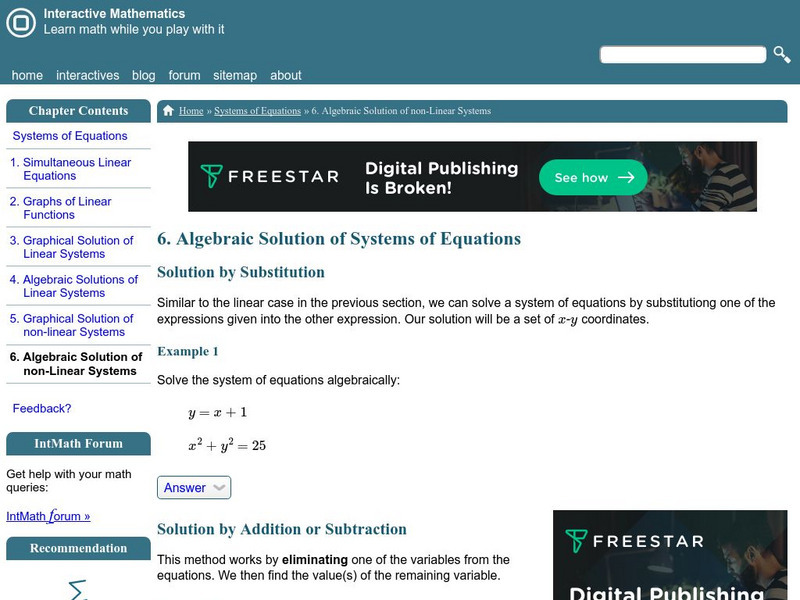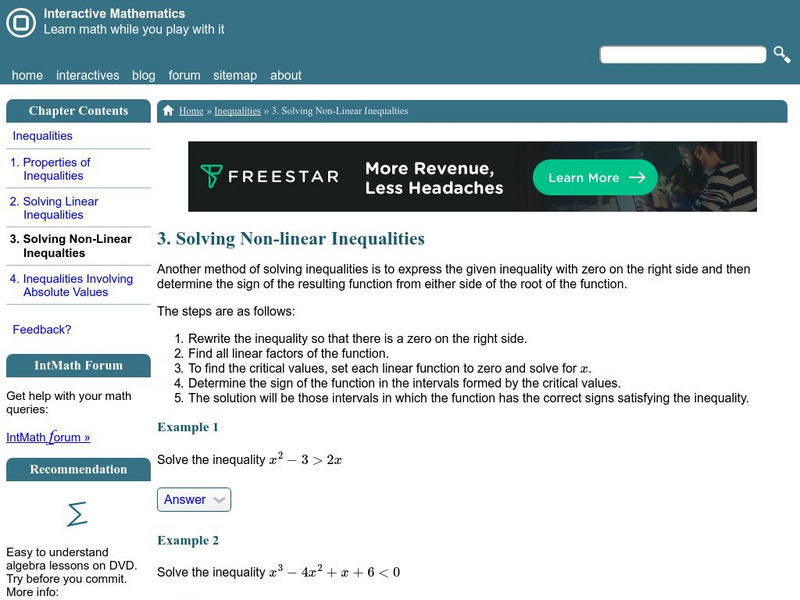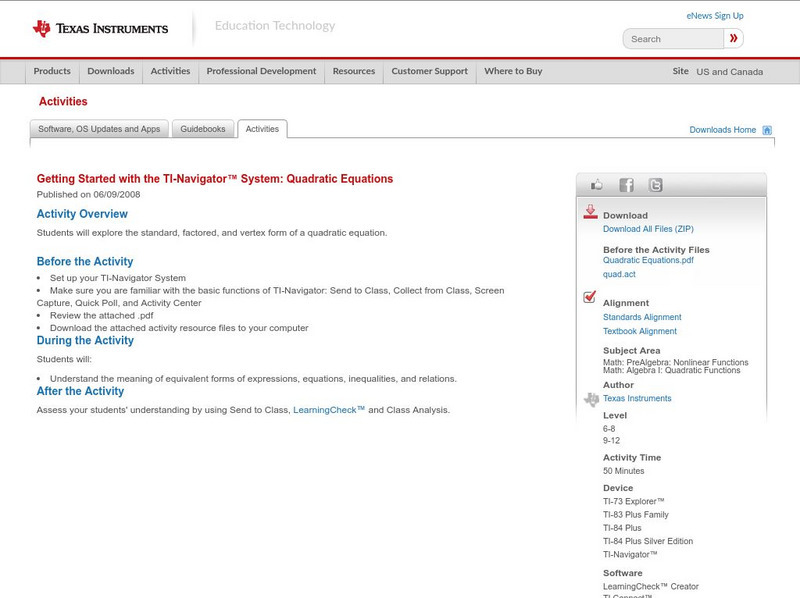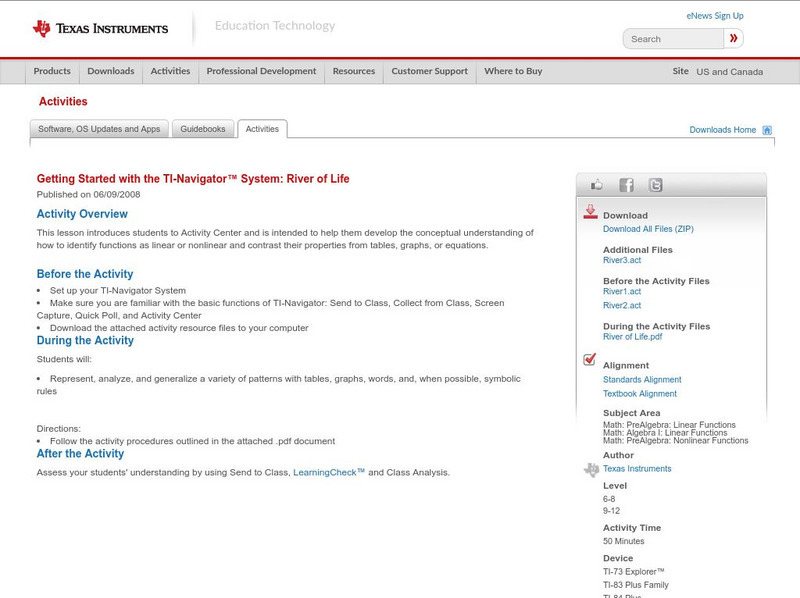Hi, what do you want to do?
Illustrative Mathematics
Introduction to Linear Functions
Introduce your algebra learners to linear and quadratic functions. Learners compare the differences and relate them back to the equations and graphs. Lead your class to discussions on the properties of a function or a constant slope...
Education Development Center
Creating a Polynomial Function to Fit a Table
Discover relationships between linear and nonlinear functions. Initially, a set of data seems linear, but upon further exploration, pupils realize the data can model an infinite number of functions. Scholars use multiple representations...
Curated OER
Do Two Points Always Determine a Linear Function II?
Learners analyze the difference between the slope intercept and standard forms of a line in this task. Given two general points using letters they explore linear functions and linear equations.
Illustrative Mathematics
Do Two Points Always Determine a Linear Function?
Your learners can approach this task algebraically, geometrically, or both. They analyze the building of a linear function given two points and expand the concrete approach to the abstract when they are asked to find the general form of...
Noyce Foundation
Digging Dinosaurs
Build a function to solve problems rooted in archeology. A comprehensive set of five lessons presents problems requiring individuals to use functions. The initial lesson asks learners to find the possible number of dinosaurs from a...
Curated OER
Do Two Points Always Determine an Exponential Function?
Algebra learners explore, analyze and build an exponential equation given its form and a specific point that exists on the function in this task. The last question asks learners to apply their ideas to an exponential equation given two...
Howard County Schools
To Babysit or Not to Babysit?
Would you work for a penny today? Use this activity to highlight the pattern of increase in an exponential function. Scholars compare two options of being paid: one linear and one exponential. Depending on the number of days worked, they...
Teach Engineering
Club Function
Let's get the herd to follow the rules. The activity associated with the second lesson in the unit introduces the class to the definition of a function. Individuals must gather in groups of zebras and rhinos defined by the general...
Curated OER
Building a General Quadratic Function
Learners rewrite a general quadratic function by completing the square to see a new form of the function that more easily identifies the x-coordinate of the vertex and the two roots of the function.
Teach Engineering
Using Hooke's Law to Understand Materials
Provide a Hooke for a lesson on elasticity with an activity that has groups investigate a set of springs. They use a set procedure to collect data to calculate the spring constant for each spring using Hooke's Law. The groups...
Illustrative Mathematics
Zeroes and factorization of a quadratic polynomial I
This activity uses the division algorithm and the definition of a zero/root of a function to guide your class to see the relationship between zeros and factors of a general quadratic, which can later be generalized to the Remainder...
Illustrative Mathematics
Lake Algae
Introduce learners to exponential growth with this real-world problem about algae that is rapidly spreading across a lake in a city park. The task presents the rate of growth and an end value and asks learners to determine what happened...
Texas Instruments
Texas Instruments: Nonlinear Pendulum Problems
In this activity, students explore the nonlinear model for a simple pendulum. They use the calculator to solve higher order differential equations.
Interactive Mathematics
Interactive Mathematics: Graphical Solution of Non Linear Systems
Using the graphing method, several systems of nonlinear equations are solved. Follow each example step by step to see how solutions are derived.
Paul Dawkins
Paul's Online Notes: Algebra: Systems of Equations
Learners examine how to solve systems of equations. Topics investigated are linear systems with two variables, linear systems with three variables, augmented matrices, and nonlinear systems. Class notes, definitions, and examples with...
Interactive Mathematics
Interactive Mathematics: Algebraic Solutions of Systems
Nonlinear systems are solved using the algebraic methods of substitution and addition/subtraction. Learn how these methods work through detailed examples.
Interactive Mathematics
Interactive Mathematics: Solving Non Linear Inequalities
The steps for solving non-linear inequalities are presented along with examples to demonstrate the processes. Examples include equations that contain quadratics, cubics and rational expressions.
Massachusetts Institute of Technology
Mit: Open Course Ware: Differential Equations
The online course consists of educational materials about differential equation. Video lectures, readings, syllabus, exams, interactive mathlets, and assignments with solutions are included.
Texas Instruments
Texas Instruments: Getting Started With the Ti Navigator: Quadratic Equations
This lesson introduces students to Activity Center and is intended to help students write systems of equations in standard form in slope intercept form to solve the system using tables and graphs.
Texas Instruments
Texas Instruments: Getting Started With the Ti Navigator System: River of Life
This lesson introduces students to Activity Center and is intended to help students develop the conceptual understanding of how to identify functions as linear or nonlinear and contrast their properties from tables, graphs, or equations.
Richland Community College
Richland Community College: Math 116 Lecture Notes
This site from the Richland Community College provides the detailed lecture notes to a college algebra course, complete with equations and definitions. Content ranges from "functions and their graphs" to "conics and parametric equations."
Texas Instruments
Texas Instruments: Getting Started With Ti Navigator: Compound Interest
This lesson introduces students' to Activity Center. In this lesson, students will explore the effect of compound interest on the amount of an investment over time. Students will work in small groups (or individually) to calculate...


























